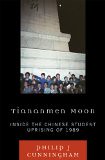It's Poetry Friday! Yay!
Today's poem is a song written by Philip Cunningham, who was an American student studying in Beijing during the 1989 Tiananmen Square protests. He includes the song in the prologue of his memoir, which I review below. Round up is over at Susan Writes!
Midnight moon of Tiannamen,
When will I see you again?
Looking for you everywhere,
Going in circles around the Square...
Riding with you down Chang’an Jie,
Memories I'd like to share...
Shadows dancing in the dark,
Lovers talking in the park...
Follow you here,
Follow you there,
Bathing in your
Sweet moonlight everywhere...
Midnight moon of Tiananmen,
When will I see you again?
Tiananmen Moon: Inside the Chinese Student Uprising of 1989 Philip J. Cunningham
Here's one that doesn't count for my China Challenge because I started it in August, but it is one that could count for your China Challenge reading, and it is one that I recommend.
Cunningham was in a unique position in the spring of 1989. He was an American studying in Beijing. His role as a student gave him many Chinese friends and acquaintances who were caught up in the student movement and Cunningham was caught up in it to. His skills in Chinese language and his knowledge of Beijing made him a valuable asset for the BBC and he started freelancing for them. Cunningham was then caught in this odd in-between of participant and observer.
The book he wrote, nearly twenty years after the fact, isn't a book about what happened and why although we get some glimpses of that. It isn't history. It is a deeply personal memoir about one man's experiences with being a foreigner in Beijing in the late 80s, and his experiences marching, protesting, and dodging bullets. It's a look at the pitfalls of international news. It's a book where one man tries to make sense of what he saw and what he did and what it meant. Along the way, he offers great insight into what happened from the point of view of the people on the ground, the ones who made it happen. We have so many books from the prospective of the historian, and even a few from the prospective of the government official, but we don't have many from the point of view of the students who were involved, especially the ones who weren't part of central command or in leadership. The fact that Cunningham is American helps him explain it to a Western reader.
It will be an easier read for those with some background of the Tiananmen movement (and it's fascinating to read against the Tiananmen chapters of Prisoner of the State: The Secret Journal of Premier Zhao Ziyang). You can read several excerpts at China Beat.


No comments:
Post a Comment